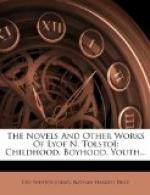Although he was on very good terms with Woloda and Dubkoff, it was clearly chance which had united them thus, since their tastes were entirely dissimilar. Woloda and Dubkoff seemed to be afraid of anything like serious consideration or emotion, whereas Nechludoff was beyond all things an enthusiast, and would often, despite their sarcastic remarks, plunge into dissertations on philosophical matters or matters of feeling. Again, the two former liked talking about the fair objects of their adoration (these were always numerous, and always shared by the friends in common), whereas Nechludoff invariably grew annoyed when taxed with his love for a certain red-haired lady.
Again, Woloda and Dubkoff often permitted themselves to criticise their relatives, and to find amusement in so doing, but Nechludoff flew into a tremendous rage when on one occasion they referred to some weak points in the character of an aunt of his whom he adored. Finally, after supper Woloda and Dubkoff would usually go off to some place whither Nechludoff would not accompany them; wherefore they called him “a dainty girl.”
The very first time that I ever saw Prince Nechludoff I was struck with his exterior and conversation. Yet, though I could discern a great similarity between his disposition and my own (or perhaps it was because I could so discern it), the impression which he produced upon me at first was anything but agreeable. I liked neither his quick glance, his hard voice, his proud bearing, nor (least of all) the utter indifference with which he treated me. Often, when conversing, I burned to contradict him, to punish his pride by confuting him, to show him that I was clever in spite of his disdainful neglect of my presence. But I was invariably prevented from doing so by my shyness.




